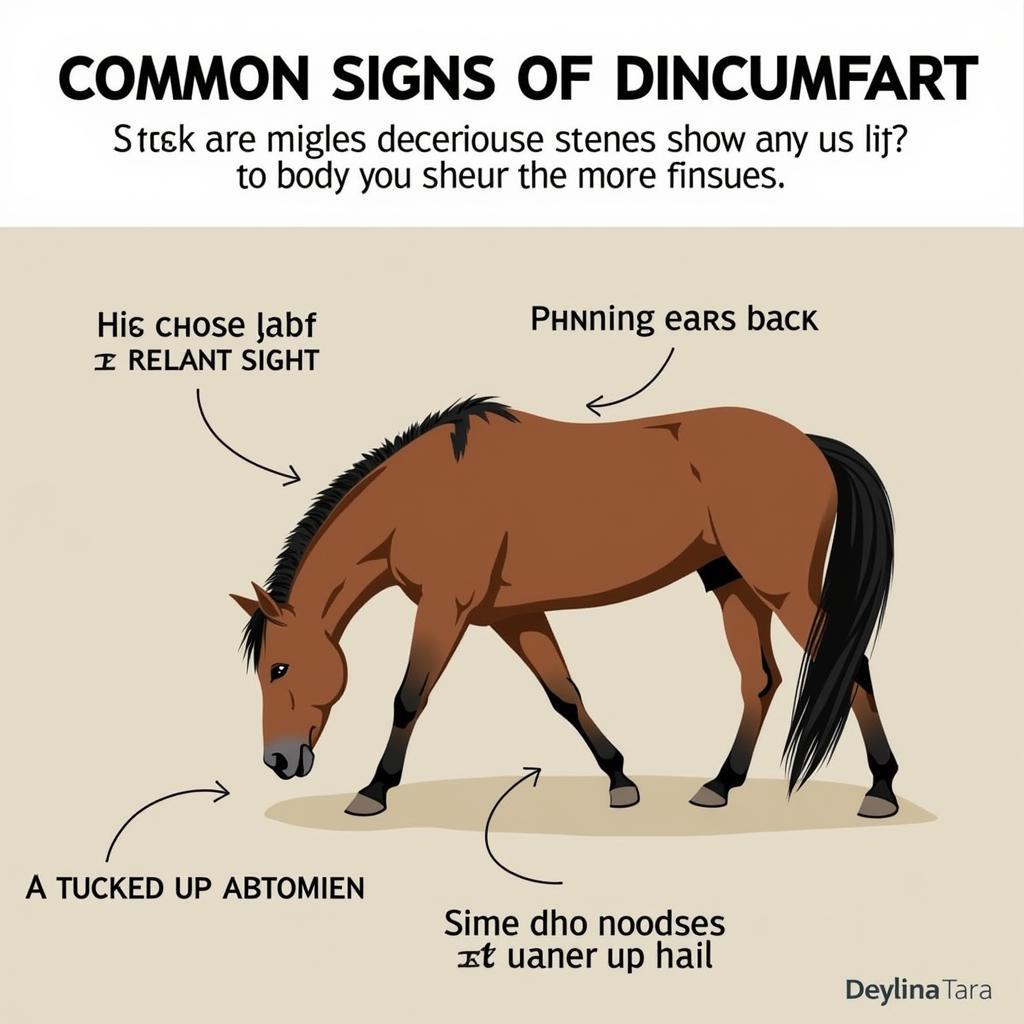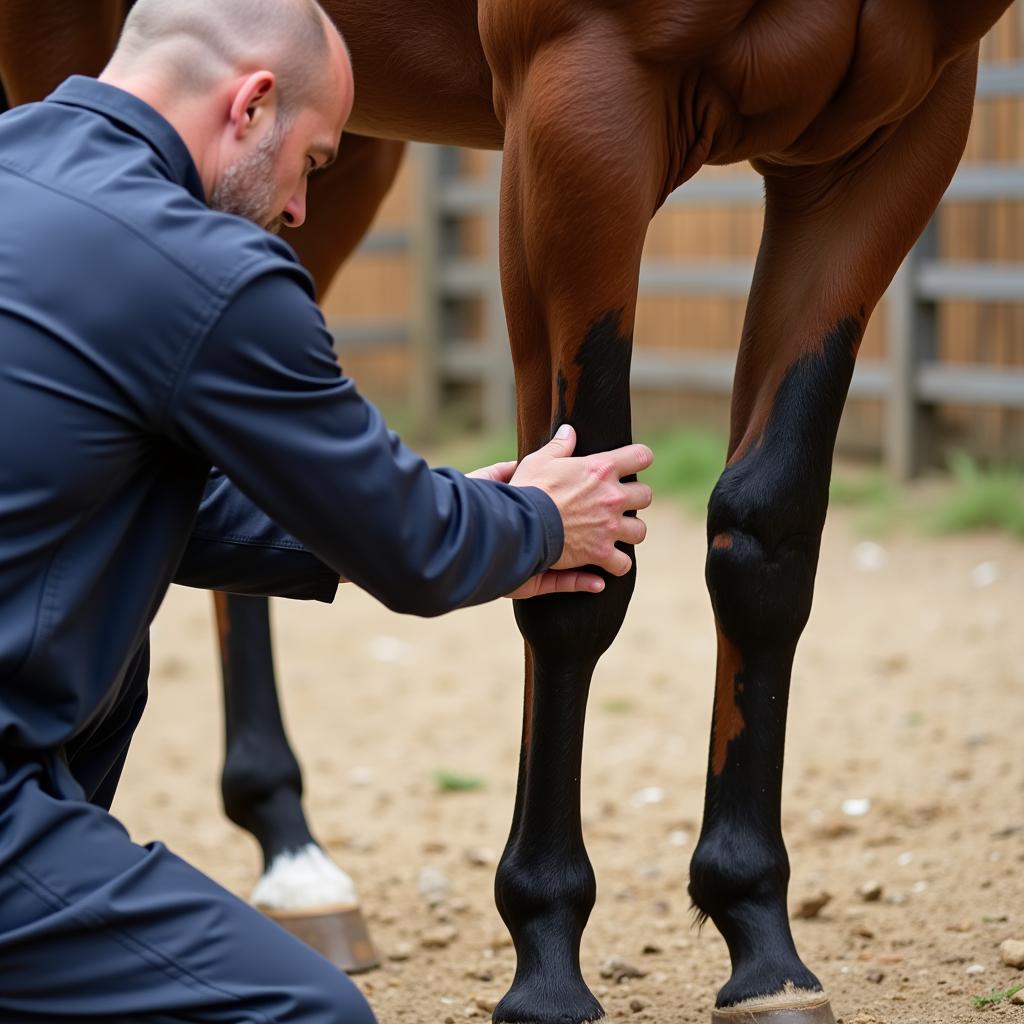As a horse owner, you know your equine companion better than anyone. You recognize their quirks, their routines, and their unique personalities. But when your horse exhibits unusual behavior or physical signs, it can be a stressful experience trying to decipher what’s wrong. That’s where a Horse Symptom Checker can become an invaluable tool in your horse care arsenal.
While nothing can replace the expert opinion of a veterinarian, understanding the common signs of illness in horses can help you determine the severity of the situation and seek appropriate care quickly.
Recognizing the Silent Language of Horses
 Horse Showing Signs of Discomfort
Horse Showing Signs of Discomfort
Horses are masters of disguising pain, a survival instinct honed over centuries. This often means that subtle changes in behavior can be the first indication that something is amiss. A keen eye for detail and a solid understanding of your horse’s baseline behavior are essential for early detection.
Common Horse Symptoms and Their Possible Causes
Let’s delve into some common equine symptoms and explore their potential underlying causes:
Changes in Appetite and Drinking Habits
Loss of Appetite: A horse that’s gone off its feed can signal a range of issues, from dental problems and ulcers to stress, infection, or even colic – a potentially life-threatening condition.
Increased Thirst: While hot weather and increased exercise can lead to greater water intake, excessive thirst can be a symptom of conditions like Cushing’s disease, kidney problems, or diabetes.
“Always have fresh, clean water available for your horses,” advises Dr. Emily Carter, a veterinarian specializing in equine internal medicine. “Monitoring their water intake, especially during changes in weather or routine, can be key to early detection of potential health problems.”
Respiratory Symptoms
Coughing: Occasional coughs can be normal, but persistent coughing can be a sign of allergies, respiratory infections, or even heaves – a chronic respiratory disease.
Nasal Discharge: Discharge from the nostrils, especially if it’s thick, discolored, or foul-smelling, can indicate an infection, allergies, or other respiratory issues.
Digestive Disturbances
Colic Symptoms: Colic is a general term for abdominal pain in horses and can manifest as pawing, rolling, flank watching, sweating, and a decreased appetite. It requires immediate veterinary attention.
Diarrhea: Diarrhea can be caused by a change in diet, stress, parasites, or more serious conditions like salmonella or Potomac horse fever.
Changes in Appearance and Behavior
Weight Loss: Gradual or sudden weight loss can indicate dental problems, parasites, chronic disease, or inadequate nutrition.
Lethargy: A lack of energy, unwillingness to move, or general depression can be a sign of pain, fever, or other underlying health concerns.
Lameness and Swelling
Lameness: Any abnormality in a horse’s gait, from a subtle head bob to a pronounced limp, is considered lameness and warrants veterinary investigation.
Swelling: Swelling in the legs, joints, or other areas can be caused by injury, infection, or inflammation.
 Veterinarian Examining a Horse's Leg for Swelling
Veterinarian Examining a Horse's Leg for Swelling
When to Call the Veterinarian
While a horse symptom checker can be a valuable tool for initial assessment, it’s crucial to remember that it’s not a substitute for professional veterinary advice. If you notice any of the following symptoms, contact your veterinarian immediately:
- Signs of colic
- Difficulty breathing
- High fever (above 102°F)
- Severe lameness
- Sudden changes in behavior
- Open wounds or injuries
- Eye injuries
- Seizures or neurological symptoms
Using a Horse Symptom Checker Responsibly
A horse symptom checker, often found online or through mobile apps, can guide you through a series of questions about your horse’s symptoms and provide possible explanations.
However, it’s essential to approach these tools with caution. Always consult with your veterinarian for an accurate diagnosis and treatment plan.
Prioritizing Preventative Care
“Prevention is always better than cure,” emphasizes Dr. Sarah Williams, an equine veterinarian with over two decades of experience. “Regular veterinary checkups, vaccinations, deworming, dental care, and a balanced diet are the cornerstones of keeping your horse healthy.”
Justus Horses USA: Your Partner in Equine Wellness
At Justus Horses USA, we’re committed to providing you with the knowledge and resources to be the best horse owner you can be. Remember, you are your horse’s advocate. By understanding their normal behavior and recognizing potential health concerns early, you play a vital role in ensuring their well-being.
Need personalized advice or support? Don’t hesitate to contact us!
Call: 0772127271
Email: [email protected]
Visit: QGM2+WX2, Vị Trung, Vị Thuỷ, Hậu Giang, Việt Nam.